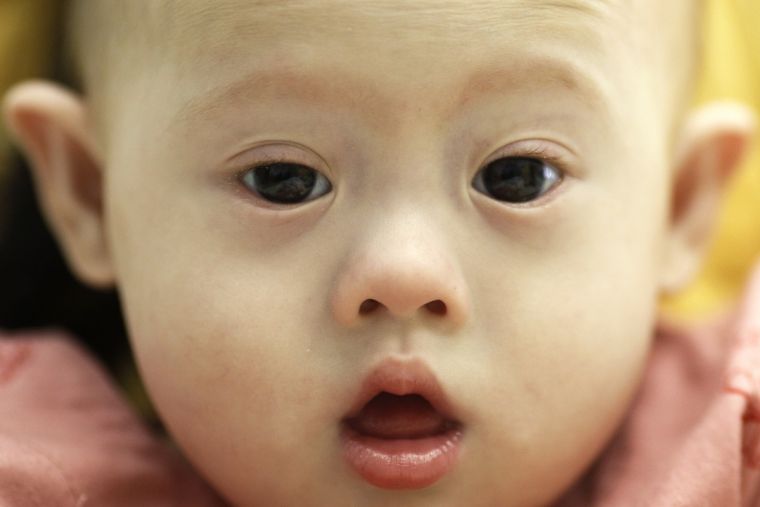Down's Syndrome Is Not A Defect To Be 'Eradicated'

We are in grave danger of sleep walking into a situation where Down's syndrome is eradicated in our society.
The government is widely expected to make a new, non-invasive and highly accurate Down's syndrome screening test (NIPT) available on the NHS. Calling it a "simple blood test" cannot disguise the chilling consequences the test will have. If you look at figures from Iceland, you can get a good picture of what will inevitably happen here. There, nearly every pregnant woman takes advantage of accurate screening tests for Down's syndrome and near on 100 per cent will terminate if the condition is detected. Meanwhile in the UK today, 90 per cent of people told their unborn baby will have Down's syndrome already choose an abortion.
It is estimated that one in every 1,000 babies in the UK are born with Down's syndrome. At the moment, the NHS offers screening that is 85 to 90 per cent accurate. Around 2.5 per cent of the predictions turn out to be false. For those wishing for a definitive prediction, the next option is either amniocentesis or CVS (chorionic villus sampling). But these are invasive tests and involve a needle being used to get a fluid sample from the placenta. They carry the risk of miscarriage and for many women, this is too great a risk.
In contrast, NIPT, which is already available in private health clinics, is 99 per cent accurate. Its non-invasive nature also means there is significantly less risk of miscarriage. Because the new test is less invasive and therefore less likely to cause a miscarriage, it is highly attractive. Its accuracy will give parents a more definitive answer as to whether or not their unborn child has Down's syndrome. But greater certainty for parents must be weighed against the long-term consequences of this new test. Such a test, with its increased accuracy will mean more women taking the test. Given that the overwhelming majority of parents already choose a termination based on the existing tests, it would be utterly naïve to presume the new, 'improved' test will not simply mean more unborn babies aborted because of Down's syndrome.
In society, we rightly affirm the value of people with disabilities. The Equality Act, passed in 2010, enshrined in law legal protections for people with disabilities. So why then do we countenance introducing a new screening test that will mean more unborn babies being terminated just because they have a particular disability? We cheer athletes at the Paralympics and marvel at their remarkable achievements. Yet we back abortion up to birth in cases of 'severe' mental or physical disabilities. Can we not agree that this is fundamentally contradictory?
This desire to identify potential disabilities in the unborn is all part of a more sinister, underlying aim. As medical science advances, we could well end up in a position where parents can choose the characteristics of their children and simply abort them, if it is thought they could be born with any form of disability or if their characteristics are not quite what the parents want. The combination of our liberal approach to gene editing and our lax, inconsistent attitudes towards abortion are a severe threat to future generations.
This Wednesday, BBC 2 will screen a documentary with the Bridget Jones actress Sally Phillips called 'A World without Down's syndrome?'. In it, Phillips will examine the chilling prospect of a world without Down's syndrome. Her 12 year old son, Ollie has Down's syndrome and Phillips is quick to talk about the joy he has brought to her life. For Phillips, too much of our discussion about Down's syndrome is negative: "There were lots of moments during Olly's babyhood where I would think to myself, 'Wait a minute, I am not experiencing this as a disaster.' But you are so bought into the narrative. All the pregnancy books refer to Down's syndrome as a 'defect'. All you get is this information that says 'High incidence of leukaemia, high incidence of deafness' ... It's totally overwhelming and unhelpful."
Phillips is surely right to call for a more balanced discussion. Down's syndrome is not simply a genetic defect we need to eradicate. There are people behind this condition who are part of the richness and diversity of life. We should attach as much value to them both in the womb and outside as we do to those with no genetic condition.
It is helpful to remember that in contrast to the world-view held by too many, in the Christian world-view, we value all life, from its natural beginning to its natural end. We affirm every human being as made in God's image, including all those with Down's syndrome and we see this value as beginning at conception, not at some arbitrary point weeks into pregnancy. In Christian thinking a foetus is a child, not an 'undeveloped baby'. I sincerely hope this test is not introduced. But more than that, I hope more of us can stand up for those in our society who are different, and affirm their value as something intrinsic and inherent and not based on mere disability.
James Mildred was former press officer for Ruth Davidson MSP before running CARE's press office. He is now training with a church just north of Bristol.











